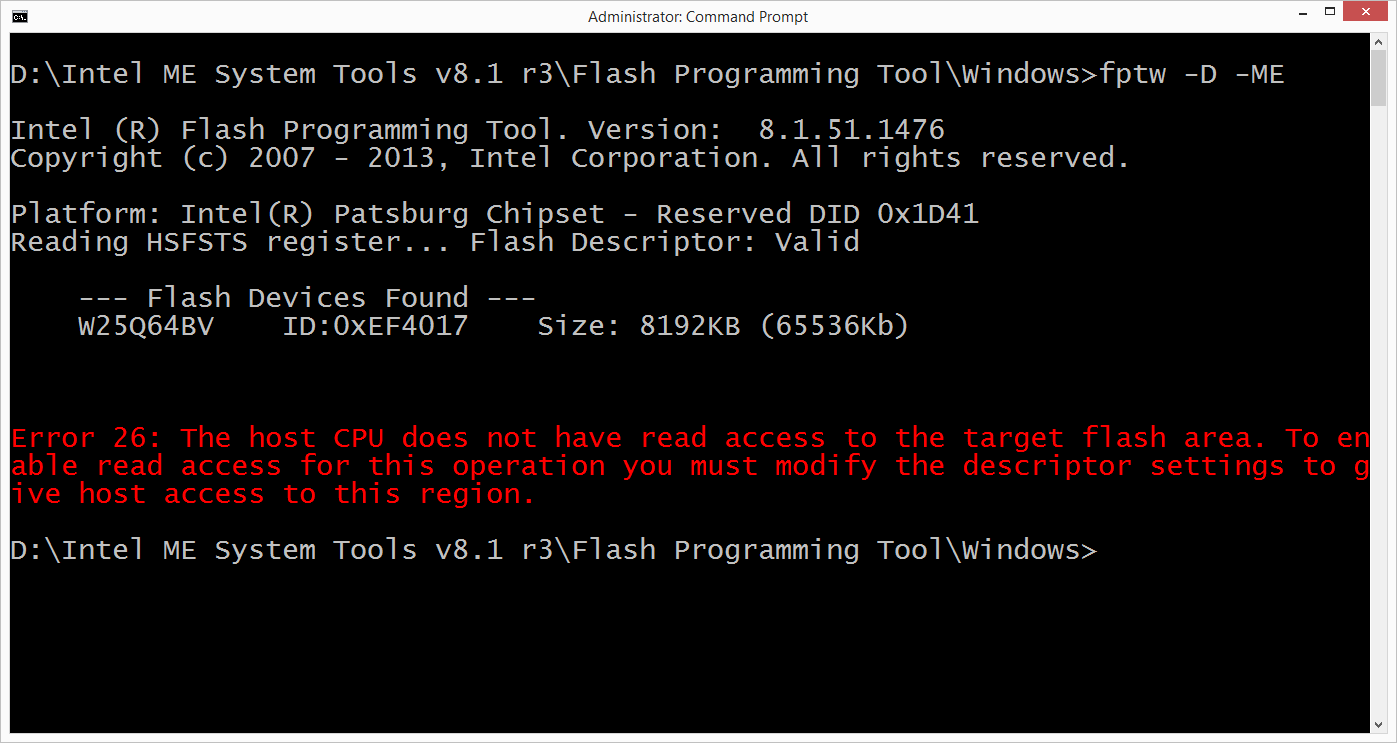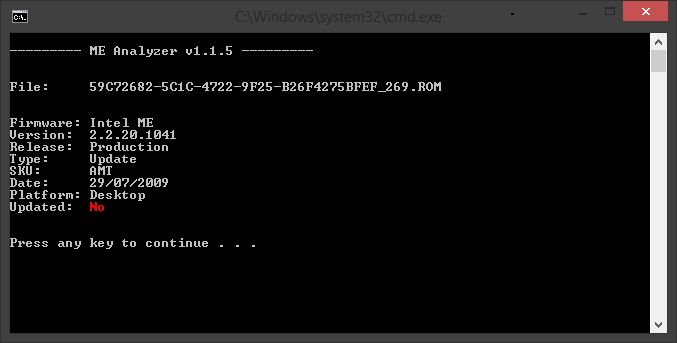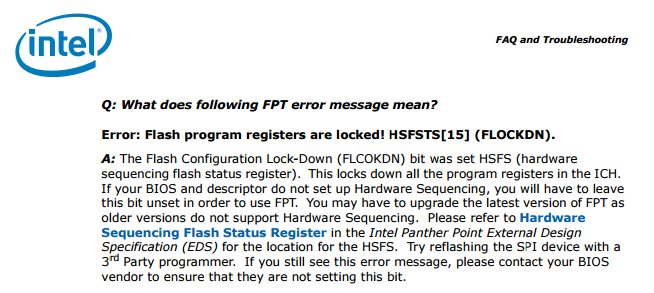Here it is…shot of the FPT…

Here it is…shot of the FPT…

Yes, as I suspected you have a locked flash descriptor. You must either do the pin-mod (very difficult due to the small chip size as I said before) or get a cheap programmer to reflash the chip.
Have you tried ASRock’s Crashless BIOS feature? Maybe (probably not) this can restore the whole SPI image (including the ME region) and not just the BIOS region. Find information on how to use it via the manual etc and try it. Maybe you’ll get lucky.
And yes, the ME does look like it’s bricked and thus it’s normal to be facing so many issues as it’s a critical part of the Intel platform.
If by the crashless means running BIOS update through their routine… yes I did it
According to ASRock
Place the latest BIOS rom image from ASRock at the root of a USB flash drive which
a) must be empty apart from the rom image
b) must be FAT32 formatted
c) must be connected at a USB2.0 port only, not USB3.0 one
In theory, when you start the system with such a configuration, it will try to restore the BIOS. Hopefully the whole SPI image and not just the BIOS region.
Also, under Advanced>Me Subsystem, what other sub-menus & options are there exactly apart from ME Version?
So basically I stick the USB into USB2.0 port…any one…disconnect all drives…I assume, fire it on and it shall automatically start procedure?! On my Asus move I have designated port for similar purpose…OK I’ll try it when got from work…what can I lose…besides, you mentioned some pins tone shorted…any clues which ones?
Yes, you need to short pin 1 and pin 5 of your Realtek Audio chip while the system starts. If you succeed (as I said, very difficult nowadays) the system will boot with an unlocked descriptor. It will get locked again after a normal reboot.
1. Shut Down the computer
2. At your motherboard, find the Realtek Audio chip
3. Use tweezers or a paper clip to short together pins 1 and 5

Hello,
i have an Intel DQ965GF-Mainboard and updated the ME from v2.2.20.1041 to v2.2.30.1046 - working flawless.
But now i can’t update or restore BIOS, because it stucks while “updating” the ME. I want to flash the same BIOS, modified with Intel Integrator Toolkit.
What i tried:
-Downgrade ME with FWUpdate Tools, i tried all versions: Not possible
-BIOS-Flash with original and modified .BIO-File: Not working, ME-updating failed.
-BIOS-Recovery with USB-Stick or CD: No screen (as expected), but not working - i don’t know why, PC stays on, no beep or restart/switchoff.
-Flash Programming Tool: No access, locked chip (FLOCKDWN)
So, any solutions? External SPI-Programmer? Or modified BIOS with integrated ME-Update? 
Thank you for reporting that. Did you use the firmware and System Tools package I have put at the first post? Although I didn’t expect issues, noone had reported until now whether everything worked out as intended. Good to know that.
Before ME7 it wasn’t possible to downgrade to earlier ME firmware versions using FWUpdLcl. Only with FPT + full ME Region (RGN). However I am not entirely certain regarding the ME2 FPT tool because it was part of the first generation of ME.
Exactly what I thought as well.
A BIOS with integrated ME region is probably the best solution, without getting a programmer I mean. The latest Intel BIOS has ME 2.2.20.1041 inside:

Now, Intel .BIO images have two ME parts: One Region (RGN) and the equivalent Update (UPD) image.
If you were to replace the ME inside the modded BIOS, you would have to do so only for the UPD image since the latest RGN image I have at the repository is the same as your’s, meaning 2.2.20 and 2.2.30 that you want.
Maybe, during the BIOS update, only the UPD image is used and not the RGN one. So, you can try to replace the UPD image with 2.2.30 and keep the RGN to 2.2.20 and see if it get’s stuck again at "Updating ME" step. Hopefully that will be enough.
Can you try dumping your current ME 2.2.30 Region (RGN)? The commands are Fprogw -d BIOS.bin (for the full SPI dump) or Fprogw -d -me ME.bin (for ME Region dump only). If it’s successful (which I doubt because you probably have a locked flash descriptor), I will add the dumped 2.2.30 Region (RGN) to the repository because currently I have up to 2.2.20.
Yes, tools and files are from packages. Updating done with FWUpdLcl under DOS.
I get always the same error, when using fprog under DOS, regardless which command is used:
The ITK is creating an .BIO-file and .exe to flash out of Windows. The PC restarts (i guess it creates a ramdisk?) and flashes the file.
Under Windows 7 i get dll-failure with fprogw.exe - perhaps caused by 64bit-OS.
This lock must be another Intel protection.

Try a newer version of FPT. For example try the one from the ME8 package. FPT is basically a generic Intel flasher, I don’t think it matters if you use a newer version of it. Try the commands:
fptw64 -i (to verify your chip can be identified)
and then
fptw64 -d BIOS.bin to see if you can dump it’s contents
Both these commands are safe either way (just read data, not write).
Ok, i tried it with Windows XP 32bit. Error: Could not find fparts.txt.
But the fparts.txt is in the same directory…this software is crap!
Later i’ll try your solution, but i’m very sure, that it won’t work. The fptw.exe version 5 can’t recognize the ME, later versions probably too.
FPT only works for the ME generation it was targeted at (though you can use newer fparts lists with older FPT):
For ME8 you need to use FPT v8.x
Also better use the DOS version…
None of the higher versions work. Error 201: FPTw.exe cannot be run on the current platform. ![]()
Any solution for flashing a modified BIOS-file or modified iflash.exe with overriding/ignoring the version of ME?
Yes, the only example of that FPT use is for FPT8 which does work on ME7 platforms. Anyway, you haven’t tried replacing the UPD image inside the .BIO file with the latest 2.2.30, that may work and “skip” that “Updating ME” stuck error.
Ok, can you explain how to do this task or a link for a tutorial?
There is no tutorial really, I explained what to do in general HERE.
Use PhoenixTool v2.59 to extract the proprietary/annoying .BIO images from Intel. First, open the .BIO image with PhoenixTool, let it extract and just repack the .BIO again. Check that the resulting file is exactly the same as the original. This way you can verify that PhoenixTool can properly unpack and repack your .BIO image. Just a safety measure. If everything goes according to plan, open the .BIO again and let is extract all modules at the DUMP folder. You then need to find the UPD ME image module, use ME Analyzer for that (sort by size at the DUMP folder, only the bigger files are the one that interest you). Then, adjust the 2.2.30 UPD image to be the same size as the module from the .BIO file by adding or removing padding at the end, rename it as exactly the same as the UPD module and replace it. Then, pack the .BIO image again using PhoenixTool. If the flasher that Intel uses checks only the ME UPD image and not the RGN that is also included this should allow you to proceed without getting stuck at "Updating ME" as you said earlier.
EDIT: I just remembered that Intel .BIO images have a digital signature that will be broken if the image is modified and the flasher won’t allow you to continue. However, I also remembered that some time ago another user with such a motherboard was trying to update his RAID oROM. Guess what, he had the exact same motherboard as you. He got a programmer and dumped his firmware which he also attached to his forum post. The thread can be found HERE. In theory you could take that dump, update the ME and then flash it back with FPT. However,
a) It’s not advised to flash someone else’s dump, you could lose some keys, MAC address etc that are specific to your motherboard.
b) I’m not sure if FPT will allow you to flash the modded dumped image based on the error you mentioned earlier and I don’t know what other flasher could be compatible with such boards. FPT is certainly the safest bet.
Generally, if you have a socketed SPI chip, getting a programmer is the easiest way to modify your BIOS and update oROMs, ME, LAN, Microdode etc (which Intel ITK never allows you to do in the first place). Also, if something goes wrong, you can easily recover to your saved/backed-up SPI dump image.
I have the solution for the guy two years ago…intel-slic-tool is well known.
Ok, with PhoenixTool i get error while rebuilding the image. I found the extracted ME-file, it is exactly the same as the files in your repository. But as expected, the signature will fail flashing (i guess).
None of FTP are working because of the lock. So SPI-programmer will be only way…thanks for spending time with my problem!
Yes, the programmer is the easiest solution. Even if it wasn’t for the digital signature, PhoenixTool kept complaining about “wrong size” or similar even though I was doing everything correctly. After an hour of trying I gave up and I remembered that other thread. Anyway, can I ask for a favor?
If you get a programmer and dump your SPI image, can you attach it so that I can take the 2.2.30.1046 RGN ME firmware? Or if you don’t want to attach it you can use Ftoolc (how FITC was called back at ME2,3 days) and attach the extracted ME Region.bin image. I’m asking so that I can add it to the Firmware Repository.
Alright so to update to 11.0.0.1133, I also need to update firmware to 9.1.26.1006, correct? Current versions: Driver Version: 10.0.30.1054 ; Firmware Version: 9.1.1.1000. I have a Z97, so someone please correct me if I’m wrong.
You don’t have to update the firmware to update the driver. For your Z97 system, indeed you can update the firmware to the latest 1.5MB one which is 9.1.26.1006. Then you can update your driver to the latest 11.0.0.1133 if you want but it’s not as important. Staying at 10.0.30.1054 is just fine as well. The ME11 drivers are mostly for newer Skylake systems that are not even released yet, not that they are not compatible with all post 6-series systems.